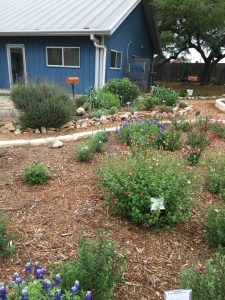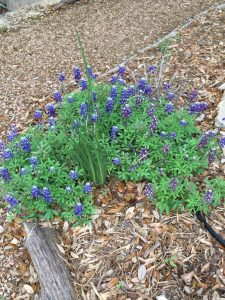We gardeners know mulching is important. It preserves moisture, moderates soil temperature and adds nutrients to the soil. Many of us don’t do it as well or as regularly as we should. Here’s an informative article by a Guest Poster from The Lawn Mower Hut.
Seasoned gardeners know very well just how beneficial mulch is for maintaining a healthy garden. By taking the time to mulch the likes of grass clippings and fallen leaves, your garden stands to enjoy various benefits, from healthier lawns to saving you a fair amount of money!
However, not everyone is fully aware of the advantages of mulching, while many don’t even know what mulch is! Check out the guide below for all the info you need to know about mulching.

What is Mulch?
Many people have purchased mulch from garden centers, so are familiar what it is, having placed it on flower beds and tree bases. Simply put, mulch is an organic material used to insulate soil, protect the moisture of a plant, and provide a rich source of nutrients as it slowly decomposes.
It’s available in many forms, with most store-bought mulch being made from bark or peat. However, it’s possible to make your very own mulch using grass cuttings and fallen leaves, providing you have the right tools for the job.
The Benefits of Mulching
The best part of mulching is the nutrients provided. When adding mulch to a lawn or flower bed, nutrients from the materials are returned to the soil as they slowly break down, essentially providing you with a natural fertilizer.
After a few years of mulching, your lawn will look much healthier and vibrant. In fact, you may find that mulching is so beneficial for your lawn that you no longer need to purchase lawn fertilisers to keep it looking vibrant and healthy, so your wallet could also benefit from mulching!
Because mulch takes time to decompose on lawns or borders, it offers exceptional insulation, keeping things warmer during the winter months while keeping it cooler during the summer. This also helps to retain moisture better, slowing down water loss that would normally have a negative impact on your lawn.
As if that wasn’t good enough, you may even be able to avoid weeds by regularly mulching.
The previously mentioned benefits also slow and eventually prevent seed germination, meaning you could end up with very little or no lawn weeds after a few years of mulching – a great advantage for the many people that detest weeds on their lawns and flower beds!
Not only that, by mulching leaves and grass cuttings rather than throwing it out, you save yourself a lot hassle racking up debris – a great option if you suffer from back problems!

How to Mulch
A great thing about mulching is just how easy it is to do.
All you need is a suitable lawn mower with a mulching feature, and you are good to go. Lawn mowers with mulching functions have a serrated blade that cuts the grass into tiny bits before redistributing it across the lawn.
You don’t need to take any different approach to mowing your lawn, as the mulcher feature does all the work for you, so just mow your lawn as you normally would during each season. Plus, it can also be used on fallen leaves, so if you have any trees in your garden make sure you do not dispose of the leaves – get them turned to mulch instead!
If you want to mulch fallen leaves, simply rake them (or use a leaf blower) to gather them across your lawn as evenly as possible. Get your mulching mower ready, and then mow over all the leaves like your mowing your lawn.
Leaves are a bit tougher to mulch as they’re bigger and thicker than grass blades, so you may have to back across the leaves if you happen to notice large chunks still lying around. Going over leaves at different angles helps to even mulch so your entire lawn benefits from the added nutrients.
Also, try to avoid mulching your lawn or leaves when they are wet. While mowers can certainly tackle damp material, it usually results in clumpier mulch that isn’t evenly distributed or shredded enough to decompose quickly.
If own a leaf vacuum, you use this to create mulch for lawns and flower beds. Essentially a leaf blower that vacuums leaves, a leaf vacuum shreds the debris into fine particles which you can then place on lawns.
Best Time to Mulch
The best time to mulch depends on what you are mulching. For instance, if you are mulching leaves, then you obviously need to wait until autumn to ensure there’s enough leaves to mulch. Of course, if you have lots of trees you may need to mulch over several weeks as the leaves continue to fall, so any time during autumn should be fine to mulch leaves.
Don’t fall into the mistake of waiting too long to mulch leaves. Many think it’s a good idea to wait until spring once the growing season occurs to start mulching leaves, but this isn’t the best idea. The reason for this is that the decomposing process actually requires nutrients, so they will be competing with your plants during prime growing season.
When it comes to mulching grass clippings, its best done when you are trimming small amounts from the top. This is because too much clippings will struggle to break down quick enough, resulting in thatching – you want small amounts that fall beneath the grass and onto the soil surface itself.
A good rule of thumb is to never mulch lawns with grass longer than 7cm. Taking too much length from the grass isn’t good for lawn health anyway, so mulching should only be done once you are regularly mowing small amounts of length from your lawn.
Mulching lawn mowers with adjustable cutting heights are therefore highly recommended to ensure you get the best mulching possible throughout the year.
